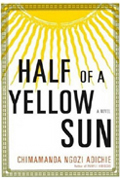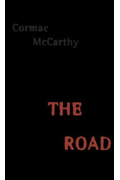
The Morning News Tournament of Books, sponsored by Powell’s Books, is an annual battle royale amongst the top novels in “literary fiction” published throughout the year. Read more about this year’s tournament »
» Buy the Books at Powells.com «
» Meet This Year’s Judges «
» Check the Bloggers’ Office Pool «
» Relive the Action: 2006, 2005 «
» Contact the Tournament Staff «
• SEMIFINALS • MATCH ONE •
March 26, 2007
 |
Half of a Yellow Sunby CHIMAMANDA NGOZI ADICHIE |

|
| v. | ||
The Roadby CORMAC McCARTHY |
judged by ELIZABETH GAFFNEY
What a pairing: two books about the near annihilation of a society—one on the global scale, one the local. One set in the future, one historical. One a relentless, bleak as bones father-and-son road story. The other a multiple-point-of-view, family/war saga that is leavened with sex and the copious aromas of daily life yet freighted with genocide and slaughter. The first by an established master, the second by an exciting young writer. Similar in ways, absolutely different in content and execution. Both good. Quite a pairing.
So, let me just say, before I go further, that it barely makes sense to have to compare them. It’s like choosing between death by atom bomb and death by machete. It’s like choosing between sisters (make that twin sisters). It’s like choosing whether to kill your own child or to let him be killed by a band of roving cannibals. It’s like choosing between breakfast and lunch. This was hard.
Half of a Yellow Sun follows three interrelated characters through their experiences in the 1967 Nigeria-Biafra War. Thirteen-year-old Ugwu goes to work as a houseboy for a pro-Biafra professor and is eventually drawn into the war against his will; Olanna, a wealthy young woman of Igbo descent, distances herself from her family when she takes up with that same radical professor. Richard, an Englishman whose interest in the art and history of the Igbo people is genuine but shrouded in colonialism, takes up with Olanna’s twin sister. All of them suffer devastating losses. In telling their stories, the book manages to convey a lot of information without seeming polemic. Moving but unsentimental, it is an achievement.
The Road in set in a terrain I last saw in a recurring nightmare I used to have in high school, back before the Cold War ended. The world lies adrift in ashes. Civilization is over. Most living things are dead. The few human survivors wander around desperately searching for sustenance. I was not eager to pick it up. It seemed way too dark. I wasn’t sure I wanted to go there. But then, as the best books do, it showed me that I can love reading about a dreadful situation. I can enjoy the description of unspeakable horror, and in a cathartic way, not a sadistic one. I can find the company of unlikable characters irresistible. Thank God for literature. Art can be beautiful when its subject is not. It can make hell a place where we want to tarry, and that makes life here in Brooklyn a lot more livable.
I really like and admire Half of a Yellow Sun. I especially loved the sections that focus on Ugwu. His character is winning, even when he is at his personal worst, because he rings so true, he is so human. I felt transported in his sections, vicariously experiencing his naivety, his pride, his unvarnished intelligence, and his gradual, terrible acquisition of a kind of wisdom through exposure to the horrors of the war. In Olanna and Richard’s sections (some of the grizzliest and most dazzling, image by image), I was interested, too, yet somehow not gripped in quite the same way.
The Road is something else entirely. I stayed up all night reading it. I, who am not a softy, wept at the end. It made me want to change the world, to try to make sure it never comes to this. As a book, it’s awfully close to perfect. There is no sentence or word out of place. It is as well-crafted as a great poem, as riveting as any the most plot-oriented page-turner. I closed it with the thought that I would never forget it and the certainty that I would nevertheless want to reread it, both for the sentences and for the story.
And that is why The Road gets my vote for the Rooster.
• About the Judge •
• From the Booth •
| Back then, the most profound statements about nuclear apocalypse were being made on Kansas album covers. | Kevin | John | The trigger fingers get itchier and itchier until both sides engage in what the W.O.P.R. in WarGames would describe as Global Thermonuclear War. |
» Read Kevin Guilfoile & John Warner’s commentary on the match «

» DOWNLOAD THE BRACKETS «
• Round One •
Half of a Yellow Sun v. Absurdistan
judged by Brady Udall
The Echo Maker v. The Emperor’s Children
judged by Marcus Sakey
Firmin v. Brookland
judged by Sarah Hepola
The Second Coming of Mavala Shikongo v. The Road
judged by Maria Schneider
Arthur and George v. One Good Turn
judged by Kate Schlegel
The Lay of the Land v. English, August
judged by Colin Meloy
Alentejo Blue v. Apex Hides the Hurt
judged by Dan Chaon
Against the Day v. Pride of Baghdad
judged by Anthony Doerr
• Round Two •
Half of a Yellow Sun v. The Emperor’s Children
judged by Jessa Crispin
Firmin v. The Road
judged by Mark Sarvas
One Good Turn v. The Lay of the Land
judged by Maud Newton
Alentejo Blue v. Against the Day
judged by Sam Lipsyte
• SEMIFINALS •
Half of a Yellow Sun v. The Road
judged by Elizabeth Gaffney
One Good Turn v. Against the Day
judged by Sasha Frere-Jones
• ZOMBIE ROUND •
The Road v. Against the Day
judged by Andrew Womack
One Good Turn v. Absurdistan
judged by Rosecrans Baldwin

